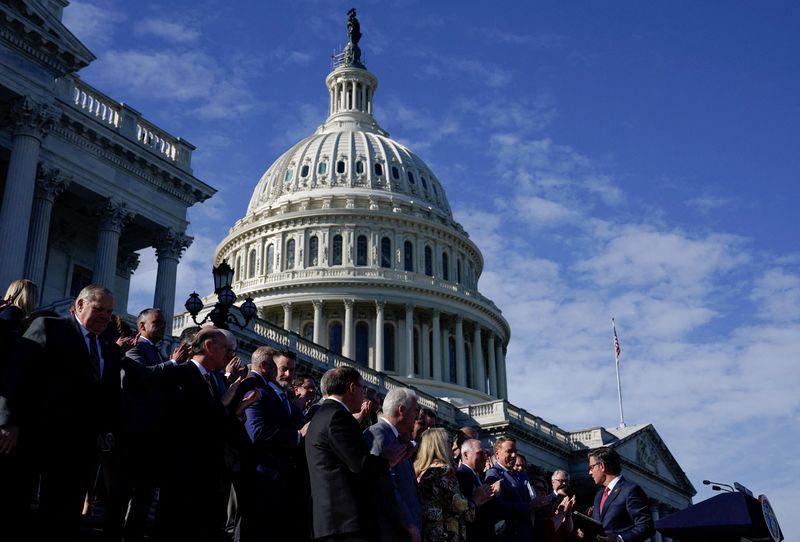As shutdown looms, US House Republicans search for stopgap solution
2023.11.07 13:56

© Reuters. FILE PHOTO: Newly elected Speaker of the House Mike Johnson (R-LA) speaks to members of the Republican conference gathered on the outer steps of the House of Representatives to listen to him deliver remarks after he was elected to be the new Speaker at th
By David Morgan
WASHINGTON (Reuters) -Republicans who control the U.S. House of Representatives showed no sign on Tuesday of coalescing around a government funding plan to keep federal agencies open, just 10 days before Congress faces its next shutdown deadline.
Republican lawmakers, who hold a slim 221-212 House majority, met behind closed doors to debate options on how to structure a stopgap measure known as a continuing resolution, or “CR,” that would temporarily fund the government after current funding expires on Nov. 17.
“Everybody’s got a little bit different position, different opinions,” Representative Brian Babin told reporters afterward. “Right now, we’re cogitating about it.”
House Speaker Mike Johnson, the top Republican in Congress, described the closed-door debate as “positive.”
“We certainly want to avoid a government shutdown. It’s a dangerous time around the world right now. We recognize that,” Johnson said at a news conference. “We’ll be revealing what our plan is in short order.”
Republican lawmakers, who say they fear being forced to back a rival funding measure from the Democratic-led Senate, told reporters they expect Johnson to unveil a stopgap measure within the next few days, ensuring a House vote early next week.
“He is going to make a play call, and I would expect that the overwhelming majority of the conference would back his play,” Representative Dusty Johnson said.
Congress must pass 12 appropriation bills to fund the government through its fiscal year.
House Republicans are focused on passing full-year appropriations bills for transportation, housing, urban development and financial services. The chamber has passed seven partisan Republican bills of the 12 spending measures needed. The Senate has passed three appropriations bills in a bipartisan package known as a minibus.
Johnson can afford to lose no more than four Republican votes on any measure opposed by Democrats, and hardline Republicans are urging him to pursue a so-called laddered CR intended to pressure the Democratic-led Senate into agreeing with the House on full-year funding bills for 2024.
Republicans have already irked Democrats with efforts to link aid to Israel and Ukraine with partisan policy riders involving the Internal Revenue Service and border security.
“What we need is bipartisan solutions,” Representative Pete Aguilar, chair of the House Democratic conference, told reporters. “That’s the only way we provide national security help to our allies. That’s the only way we solve any issue related to the border. That’s the only way we fund government.”
Some hardliners are also pushing for policy riders that would tighten the U.S.-Mexico border or set up a commission to recommend reforms to mandatory spending programs including Social Security and Medicare.
But with time for action slipping away, other Republicans argue that the best option would be a standard CR without conditions that runs into mid-January and can pass the House and Senate with bipartisan support.
Representative Eli Crane, a hardline conservative, acknowledged that a CR with border measures now seemed less likely. “There was a hesitance in there to tie the border to it,” Crane said. “I don’t think that that’s the direction they were headed.”
Another option on the House Republican table would be to negotiate with the Democratic-led Senate on a “clean” CR that can pass both chambers quickly.
“My preference is to avoid a government shutdown and to make sure that we’re taking care of our military in this tumultuous period on the geopolitical stage,” said Representative Mike Garcia. “We can’t freeze military pay.”








